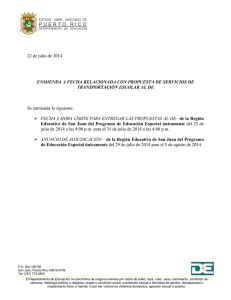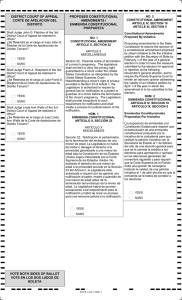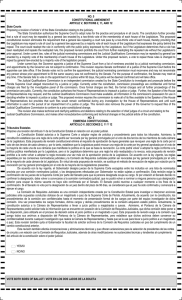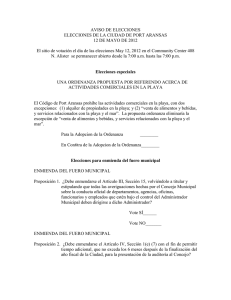vote both sides vote en los dos lados
Anuncio
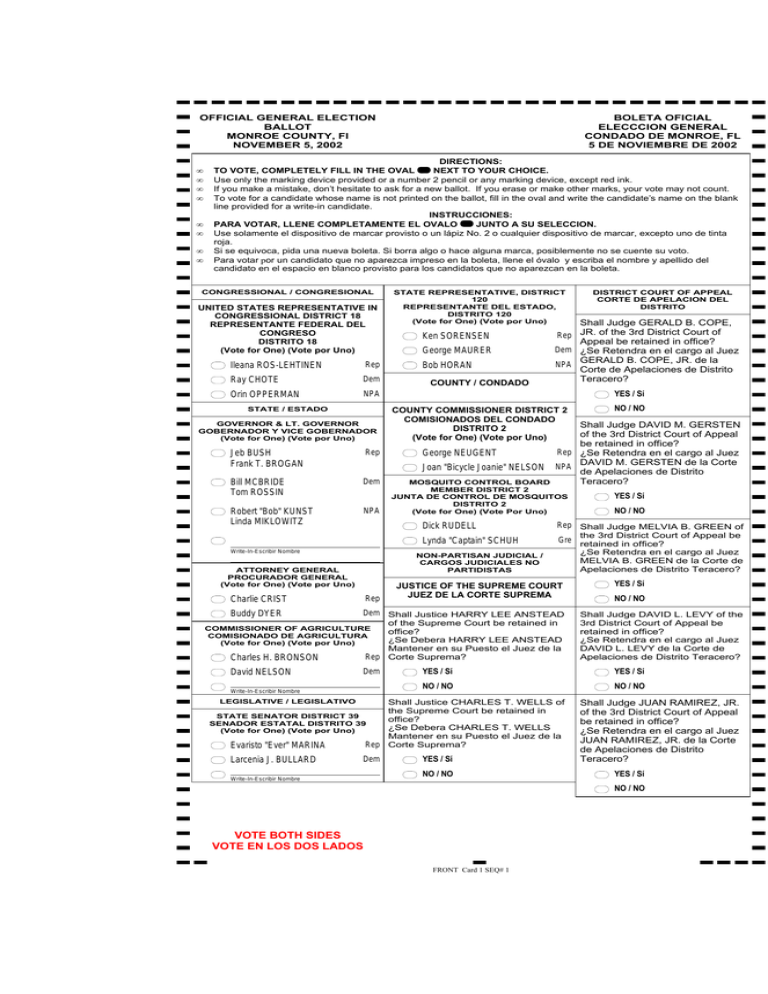
OFFICIAL GENERAL ELECTION BALLOT MONROE COUNTY, Fl NOVEMBER 5, 2002 • • • • • • • • BOLETA OFICIAL ELECCCION GENERAL CONDADO DE MONROE, FL 5 DE NOVIEMBRE DE 2002 DIRECTIONS: NEXT TO YOUR CHOICE. TO VOTE, COMPLETELY FILL IN THE OVAL Use only the marking device provided or a number 2 pencil or any marking device, except red ink. If you make a mistake, don’t hesitate to ask for a new ballot. If you erase or make other marks, your vote may not count. To vote for a candidate whose name is not printed on the ballot, fill in the oval and write the candidate’s name on the blank line provided for a write-in candidate. INSTRUCCIONES: JUNTO A SU SELECCION. PARA VOTAR, LLENE COMPLETAMENTE EL OVALO Use solamente el dispositivo de marcar provisto o un lápiz No. 2 o cualquier dispositivo de marcar, excepto uno de tinta roja. Si se equivoca, pida una nueva boleta. Si borra algo o hace alguna marca, posiblemente no se cuente su voto. Para votar por un candidato que no aparezca impreso en la boleta, llene el óvalo y escriba el nombre y apellido del candidato en el espacio en blanco provisto para los candidatos que no aparezcan en la boleta. CONGRESSIONAL / CONGRESIONAL UNITED STATES REPRESENTATIVE IN CONGRESSIONAL DISTRICT 18 REPRESENTANTE FEDERAL DEL CONGRESO DISTRITO 18 (Vote for One) (Vote por Uno) Ileana ROS-LEHTINEN Rep Ray CHOTE Dem Orin OPPERMAN NPA STATE / ESTADO GOVERNOR & LT. GOVERNOR GOBERNADOR Y VICE GOBERNADOR (Vote for One) (Vote por Uno) Jeb BUSH Frank T. BROGAN Rep Bill MCBRIDE Tom ROSSIN Dem Robert "Bob" KUNST Linda MIKLOWITZ NPA STATE REPRESENTATIVE, DISTRICT 120 REPRESENTANTE DEL ESTADO, DISTRITO 120 (Vote for One) (Vote por Uno) Ken SORENSEN George MAURER Bob HORAN COUNTY / CONDADO Shall Judge GERALD B. COPE, Rep JR. of the 3rd District Court of Appeal be retained in office? Dem ¿Se Retendra en el cargo al Juez GERALD B. COPE, JR. de la NPA Corte de Apelaciones de Distrito Teracero? YES / Sí COUNTY COMMISSIONER DISTRICT 2 COMISIONADOS DEL CONDADO DISTRITO 2 (Vote for One) (Vote por Uno) George NEUGENT Joan "Bicycle Joanie" NELSON Write-In-Escribir Nombre MOSQUITO CONTROL BOARD MEMBER DISTRICT 2 JUNTA DE CONTROL DE MOSQUITOS DISTRITO 2 (Vote for One) (Vote Por Uno) Lynda "Captain" SCHUH Gre retained in office? JUSTICE OF THE SUPREME COURT JUEZ DE LA CORTE SUPREMA Buddy DYER Dem Shall Justice HARRY LEE ANSTEAD of the Supreme Court be retained in COMMISSIONER OF AGRICULTURE office? COMISIONADO DE AGRICULTURA ¿Se Debera HARRY LEE ANSTEAD (Vote for One) (Vote por Uno) Mantener en su Puesto el Juez de la Rep Corte Suprema? Charles H. BRONSON Write-In-Escribir Nombre Write-In-Escribir Nombre ¿Se Retendra en el cargo al Juez MELVIA B. GREEN de la Corte de Apelaciones de Distrito Teracero? YES / Sí NO / NO Shall Judge DAVID L. LEVY of the 3rd District Court of Appeal be retained in office? ¿Se Retendra en el cargo al Juez DAVID L. LEVY de la Corte de Apelaciones de Distrito Teracero? YES / Sí NO / NO NO / NO Shall Justice CHARLES T. WELLS of the Supreme Court be retained in STATE SENATOR DISTRICT 39 office? SENADOR ESTATAL DISTRITO 39 ¿Se Debera CHARLES T. WELLS (Vote for One) (Vote por Uno) Mantener en su Puesto el Juez de la Rep Corte Suprema? Evaristo "Ever" MARINA Dem the 3rd District Court of Appeal be YES / Sí LEGISLATIVE / LEGISLATIVO Larcenia J. BULLARD NO / NO Rep Shall Judge MELVIA B. GREEN of Rep Dem YES / Sí Dick RUDELL Charlie CRIST David NELSON NO / NO Shall Judge DAVID M. GERSTEN of the 3rd District Court of Appeal be retained in office? Rep ¿Se Retendra en el cargo al Juez DAVID M. GERSTEN de la Corte NPA de Apelaciones de Distrito Teracero? NON-PARTISAN JUDICIAL / CARGOS JUDICIALES NO PARTIDISTAS ATTORNEY GENERAL PROCURADOR GENERAL (Vote for One) (Vote por Uno) DISTRICT COURT OF APPEAL CORTE DE APELACION DEL DISTRITO YES / Sí NO / NO Shall Judge JUAN RAMIREZ, JR. of the 3rd District Court of Appeal be retained in office? ¿Se Retendra en el cargo al Juez JUAN RAMIREZ, JR. de la Corte de Apelaciones de Distrito Teracero? YES / Sí NO / NO VOTE BOTH SIDES VOTE EN LOS DOS LADOS FRONT Card 1 SEQ# 1 PROPOSED CONSTITUTIONAL AMENDMENTS AND OTHER PUBLIC MEASURES ENMIENDA CONSTITUCIONALES PROPUESTA Y ORTAS MEDIDAS PUBLICAS NO. 1 CONSTITUTIONAL AMENDMENT ARTICLE I, SECTION 17 Amending Article I, Section 17 of the State Constitution Proposing an amendment to the State Constitution identical to a proposed amendment to Section 17 of Article I of the State Constitution which was approved by a statewide vote in 1998. The Supreme Court of Florida struck the 1998 amendment in a ruling in which four of the seven justices found that the ballot summary was inaccurate. The proposed amendment expressly authorizes the death penalty for capital crimes and expressly authorizes retroactive changes in the method of execution. The amendment changes the prohibition against "cruel or unusual punishment," currently provided in Section 17 of Article I of the State Constitution, to a prohibition against "cruel and unusual punishment" to conform with the wording of the Eighth Amendment to the United States Constitution. The amendment prohibits reduction of a death sentence based on invalidity of an execution method and provides for continued force of the sentence. The amendment permits any execution method unless prohibited by the United States Constitution. The amendment requires construction of the prohibition against cruel or unusual punishment and the proposed prohibition against cruel and unusual punishment to conform to United States Supreme Court interpretation of the Eighth Amendment to the United States Constitution. The amendment would prevent state courts, including the Florida Supreme Court, from treating the state constitutional prohibition against cruel or unusual punishment as being more expansive than the federal constitutional prohibition against cruel and unusual punishment or United States Supreme Court interpretations thereof. The amendment effectively nullifies rights currently allowed under the state prohibition against cruel or unusual punishment which may afford greater protections for those subject to punishment for crimes than will be provided by the amendment. Under the amendment, the protections afforded those subject to punishment for crimes under the "cruel or unusual punishment" clause, as that clause currently appears in Section 17 of Article I of the State Constitution, will be the same as the minimum protections provided under the "cruel and unusual" punishments clause of the Eighth Amendment to the United States Constitution. The amendment provides for retroactive applicability. Specifically, the proposal amends Section 17 of Article I of the State Constitution, to read as set forth below. The word stricken is a deletion; words underlined are additions: SECTION 17. Excessive punishments.--Excessive fines, cruel and or unusual punishment, attainder, forfeiture of estate, indefinite imprisonment, and unreasonable detention of witnesses are forbidden. The death penalty is an authorized punishment for capital crimes designated by the legislature. The prohibition against cruel or unusual punishment, and the prohibition against cruel and unusual punishment, shall be construed in conformity with decisions of the United States Supreme Court which interpret the prohibition against cruel and unusual punishment provided in the Eighth Amendment to the United States Constitution. Any method of execution shall be allowed, unless prohibited by the United States Constitution. Methods of execution may be designated by the legislature, and a change in any method of execution may be applied retroactively. A sentence of death shall not be reduced on the basis that a method of execution is invalid. In any case in which an execution method is declared invalid, the death sentence shall remain in force until the sentence can be lawfully executed by any valid method. This section shall apply retroactively. NÚMERO 1 ENMIENDA CONSTITUCIONAL ARTÍCULO I, SECCIÓN 17 Enmienda al Artículo I, Sección 17 de la Constitución del Estado La proposición de una enmienda a la Constitución del Estado idéntica a una enmienda propuesta a la Sección 17, Artículo I de la Constitución del Estado, que fue aprobada por un voto por todo el estado en el 1998. La Corte Suprema de la Florida rechazó la enmienda de 1998 en un fallo en el que cuatro de los siete jueces determinaron que el resumen de la boleta electoral fue impreciso. La enmienda propuesta expresamente autoriza la pena de muerte para los crímenes capitales y expresamente autoriza cambios retroactivos en el método de ejecución. La enmienda cambia la prohibición contra el “castigo cruel o inusual,” provisto actualmente en la Sección 17, Artículo I de la Constitución del Estado, a una prohibición contra el “castigo cruel e inusual,” para conformar la redacción de la Octava Enmienda a la Constitución de los Estados Unidos. La enmienda prohibe la reducción de una sentencia de muerte basada en la invalidez de un método de ejecución y provee para la vigencia continuada de la sentencia. La enmienda permite cualquier método de ejecución a menos que sea prohibido por la Constitución de los Estados Unidos. La enmienda requiere la construcción de la prohibición contra el castigo cruel o inusual y la propuesta prohibición contra castigo cruel e inusual para conformar la interpretación de la Corte Suprema de los Estados Unidos de la Octava Enmienda a la Constitución de Estados Unidos. La enmienda prevendría a las cortes estatales, incluyendo la Corte Suprema de la Florida, de tratar la prohibición estatal constitucional contra castigo cruel o inusual de ser más amplia que la prohibición constitucional federal contra castigo cruel e inusual o las interpretaciones de la Corte Suprema de los Estados Unidos. La enmienda efectivamente anula los derechos actualmente permitidos bajo la prohibición estatal contra castigo cruel o inusual, que podría dar permitir mayores protecciones a aquéllos sujetos a castigo por crímenes que serán provistas por la enmienda. Bajo la enmienda, las protecciones estipuladas a personas sujetas a castigo por crímenes bajo la cláusula “castigo cruel o inusual,” como aparece esta cláusula actualmente en la Sección 17, Artículo I de la Constitución del Estado, serán las mismas que las protecciones mínimas provistas bajo la cláusula de “castigo cruel e inusual” de la Octava Enmienda a la Constitución de Estados Unidos. La enmienda provee para la aplicación retroactiva. Específicamente, la propuesta enmienda la Sección 17, Artículo I de la Constitución del Estado según se expone abajo. La palabra tachada es para ser borrada; las palabras subrayadas son texto adicional: SECCIÓN 17. Castigos excesivos. - Se prohiben las multas excesivas, castigo cruel e o inusual, extinción de los derechos civiles, pérdida de la herencia, encarcelamiento indefinido y detención irrazonable de testigos. La pena de muerte es un castigo autorizado para los crímenes capitales designados por la Legislatura. La prohibición contra castigo cruel o inusual y la prohibición contra castigo cruel e inusual será construida de acuerdo con las decisiones de la Corte Suprema de los Estados Unidos que interpretan la prohibición contra castigo cruel e inusual provista en la Octava Enmienda de la Constitución de los Estados Unidos. Se permitirá cualquier método de ejecución, a menos que haya sido prohibido por la Constitución de los Estados Unidos. Los métodos de ejecución pueden ser designados por la Legislatura, y se puede aplicar retroactivamente un cambio en cualquier método de ejecución. Una sentencia a muerte no será reducida basada en el hecho de que el método de ejecución es inválido. En cualquier caso en el que un método de ejecución sea declarado inválido, la sentencia a muerte quedará en vigor hasta que la sentencia pueda ser ejecutada legalmente por cualquier método válido. Esta sección aplicará retroactivamente. YES / Sí NO / NO VOTE BOTH SIDES VOTE EN LOS DOS LADOS BACK Card 1 SEQ# 1
